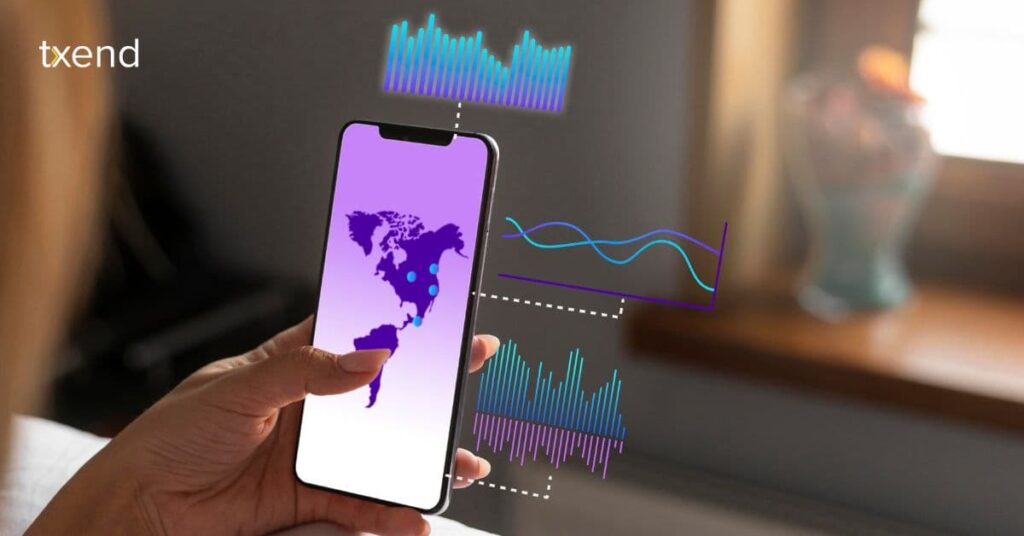Significance Of Fintech Apps
Fintech apps have emerged as powerful tools reshaping the landscape of financial services. With a symbiotic fusion of technology and finance, these apps redefine how individuals and businesses interact with their finances.
In financial management, they act as dynamic bridges, seamlessly connecting users to an array of services and solutions that were once distant and complex.
Fintech apps, short for financial technology applications, are digital platforms designed to provide users with accessible, efficient, and user-centric financial solutions. These apps encompass a broad spectrum of services, including but not limited to banking, budgeting, investing, payments, and even insurance.
Through their intuitive interfaces and innovative functionalities, they’re democratizing financial activities by rendering them convenient and adaptable to varying needs and lifestyles.
Financial Technology apps have catalyzed the shift from traditional, paper-based financial processes to seamless digital experiences that empower users to manage, invest, and transact easily.
Financial Technology apps serve as a bridge that connects the intricate realm of finance with the dynamic world of technology. They harness advanced technologies like artificial intelligence (AI) and blockchain to provide solutions that elevate financial inclusivity, transparency, and security.
Financial Technology apps give users real-time insights into their financial health, personalized recommendations, and streamlined transaction capabilities.
They break down the barriers that previously separated individuals from effectively understanding and managing their finances. This bridge, built on innovation and accessibility, allows users to navigate the complexities of finance in ways that resonate with their digital-first lives.
Impact of Fintech App Features on User Experience:
The intricate tapestry of fintech app features significantly shapes and elevates the user experience, turning financial management into an intuitive and empowering journey.
These features, meticulously crafted and strategically integrated, resonate with users on multiple levels, forging a direct link between technology and their financial aspirations.
Enhanced Convenience and Accessibility:
Fintech app features prioritize convenience, ensuring users can effortlessly access their financial information and conduct transactions anytime, anywhere. Mobile accessibility allows users to manage their finances on the go, eliminating the need to visit physical branches.
Personalization and Insights:

Features like AI-driven personalized recommendations and spending insights empower users with actionable information. These observations facilitate more intelligent financial choices, empowering users to develop a more profound comprehension of their expenditure tendencies and opportunities for enhancement.
Security and Trust:

Financial Technology app security features, including biometric authentication and encryption, foster trust by safeguarding user data and transactions. This enhances the overall user experience, assuring users that their financial information is protected.
Streamlined Transactions:

Features facilitating seamless transactions, including peer-to-peer payments and real-time fund transfers, reduce friction in financial interactions. Users experience quicker, hassle-free payments, enhancing their satisfaction.
Empowering Financial Literacy:
Many Financial Technology apps offer educational tools and resources, empowering users to enhance their financial literacy. This improves their understanding of financial concepts and boosts their confidence in managing their finances effectively.
Investment Opportunities:
Investment-related features, such as fractional ownership and robo-advisors, democratize investing. Users can access investment opportunities with lower entry barriers, enabling them to grow their wealth and achieve financial goals.
Real-time Notifications:
Instant notifications regarding account activity, transactions, and reminders empower users with real-time information. This transparency enhances user control and awareness of their financial situation.
Budgeting and Savings Tools:

Financial Technology apps offer tools for creating budgets, setting savings goals, and tracking progress. These functionalities empower users to seize command of their financial future by encouraging responsible financial conduct.
Also Read: Revolutionizing Finance Through Fintech App Development
Types of Features in a Good Fintech App
1-Smart Spending Insights:
Smart spending insights are a transformative facet of advanced Financial Technology apps, driving users toward informed financial decisions. These insights encompass three key components that collectively elevate the financial experience within the app:
- Expense Categorization: A robust Financial Technology app excels in precisely categorizing expenses. Users can see where their money is being allocated by automatically sorting transactions into categories like groceries, entertainment, or bills.
- Spending Analysis: Financial Technology apps conduct deep-rooted spending analysis. This function furnishes users with a comprehensive depiction of their expenditure trends over a duration, elucidating patterns, variations, and potential zones for expenditure reduction
- Personalized Recommendations: Leveraging AI, Financial Technology apps offer customized recommendations based on a user’s financial habits. These insights provide tailored suggestions for optimizing spending and achieving financial goals, fostering a proactive approach toward money management.
2–Intelligent Investment Tools:

Intelligent investment tools are a cornerstone, equipping users with powerful capabilities to optimize their investment strategies. These tools encompass several key features that collectively empower users in their investment journey:
- Robo-Advisory Services: Financial Technology apps leverage robo-advisory services driven by AI algorithms. These services analyze users’ financial profiles, risk tolerance, and investment goals to provide automated investment recommendations tailored to their individual needs.
- Portfolio Tracking and Management: The ability to effortlessly track and manage investment portfolios is paramount. Financial Technology apps offer real-time updates on investment performance, asset allocation, and potential areas for rebalancing, enhancing users’ control over their investments.
- AI-Powered Predictive Analytics: By harnessing AI’s power, Financial Technology apps utilize predictive analytics to offer insights into market trends and potential investment opportunities. These data-driven predictions aid users in making well-informed decisions about their investment choices.
By incorporating intelligent investment tools into Financial Technology apps, users can confidently navigate the complexities of investing.
The amalgamation of robo-advisory services, portfolio tracking and management, and AI-powered predictive analytics facilitates personalized investment strategies, real-time monitoring, and data-driven decision-making, culminating in a more empowered and successful investment experience.
3-AI-Enhanced Customer Service:
AI-enhanced customer service is a pivotal aspect of modern Financial Technology apps, elevating user experiences and ensuring seamless interactions. This facet encompasses three vital features that collectively enhance the customer service realm within the app:
- In-App Chat Support: Financial Technology apps integrate in-app chat support to provide users with instant assistance. This feature enables users to resolve queries swiftly, report issues, or seek clarification directly within the app, eliminating the need for external communication channels.
- Virtual Assistants: Virtual assistants powered by AI technology offer proactive assistance and engagement. These digital helpers respond to user queries, provide real-time insights, and guide users through various app functionalities, enhancing user navigation and engagement.
- Personalized Customer Insights: AI-driven customer insights provide users with tailored recommendations and solutions. By analyzing user behavior and preferences, Financial Technology apps offer customized suggestions, such as optimal financial products or budgeting strategies.
By integrating AI-enhanced customer service features, Financial Technology apps ensure users receive timely and relevant assistance.
In-app chat support, virtual assistants, and personalized customer insights collectively enhance the user experience, foster engagement, and demonstrate a commitment to providing responsive and value-added customer care.
4-Secure AI-Powered Authentication:

Secure AI-powered authentication is a fundamental component of modern Financial Technology apps, ensuring user data remains protected while maintaining seamless access. This category comprises three pivotal features that collectively bolster the security framework within the app:
- Biometric Authentication: Fintech applications utilize biometric authentication, like fingerprint or facial recognition, to accurately confirm users’ identities. This adds a layer of security by utilizing unique physiological characteristics for access.
- Dual-Factor Authentication (2FA): Enhancing security further, dual-factor authentication mandates users to furnish two distinct means of verification. This could involve a combination of something they know (password), something they have (phone or token), or something they are (biometric).
- Behavioral Authentication: Behavioral authentication leverages AI to analyze users’ behavioral patterns and interactions within the app. By recognizing familiar patterns and detecting anomalies, the app can verify users’ identity based on their unique usage habits.
Financial Technology apps prioritize data protection by incorporating secure AI-powered authentication features without compromising user convenience.
Biometric authentication, two-factor authentication (2FA), and behavioral authentication fortify the app’s security measures, ensuring that only authorized users gain access while maintaining a seamless and user-friendly experience.
5-Financial Well-Being Solutions:
Financial well-being solutions are integral to cutting-edge Financial Technology apps that foster users’ financial health and empowerment. This category encompasses three key features that collectively contribute to users’ financial well-being:
- Financial Education and Literacy: Financial Technology apps offer educational resources to enhance users’ financial literacy. These resources include articles, tutorials, and interactive content that empower users with the knowledge needed to make informed financial decisions.
- Behavioral Finance Insights: Insights into users’ financial behaviors and tendencies. By analyzing these patterns, Financial Technology apps provide personalized recommendations that guide users toward healthier financial habits, such as curbing impulsive spending or increasing savings.
- Personalized Goal Tracking: Financial Technology apps facilitate goal tracking by allowing users to set personalized financial goals. The app monitors progress, provides insights, and offers actionable steps to help users achieve their objectives, whether saving for a vacation or building an emergency fund.
Integrating these financial well-being solutions into Financial Technology empowers users to take control of their financial futures.
Through educational resources, behavioral insights, and personalized goal tracking, users can develop more vital financial habits, make sound decisions, and work towards their aspirations with confidence and knowledge.
6-Smart Coupons and Shopping:

Smart coupons and shopping features redefine how users engage with their finances within Financial Technology apps. This category encompasses three key elements that collectively enhance users’ shopping experiences:
- Coupon Aggregation: Financial Technology apps gather and curate coupons from various retailers, streamlining the process of discovering and accessing discounts. This feature empowers users to save money effortlessly while shopping for their desired products or services.
- Personalized Offers: Leveraging AI algorithms, Financial Technology apps provide customized offers based on users’ preferences, purchasing history, and browsing behavior. These tailored promotions ensure users receive deals that align with their interests and needs.
- AI-Enhanced Shopping Experience: Financial Technology apps enhance the shopping journey with AI-driven insights. Users can receive real-time product recommendations, price comparisons, and reviews, making their purchasing decisions more informed and efficient.
By integrating smart coupons and shopping features, Financial Technology apps contribute to users’ financial well-being by enabling them to save money while shopping intelligently.
Coupon aggregation, personalized offers, and AI-enhanced shopping experiences transform the shopping process, enhancing user satisfaction and promoting intelligent spending habits.
7-Advanced Machine Learning Investments:
Advanced machine learning investments are pivotal in cutting-edge Financial Technology apps, revolutionizing the investment landscape. This category entails three critical features that collectively elevate investment strategies:
- Predictive Investment Insights: Financial Technology apps employ predictive analytics powered by machine learning to offer valuable insights into potential investment opportunities. These insights are based on historical data and market trends, aiding users in making more informed decisions about their investment choices.
- AI-Driven Portfolio Optimization: Machine learning algorithms analyze users’ portfolios and market conditions to optimize asset allocation. This AI-driven approach ensures that portfolios are aligned with users’ risk tolerance and financial objectives, enhancing the potential for returns.
- Data-Backed Investment Decisions: Financial Technology apps leverage machine learning to provide data-backed investment recommendations. By scrutinizing vast amounts of financial data, these apps offer users a foundation of knowledge to base their investment decisions.
Integrating advanced machine learning investments within Financial Technology apps empowers users with advanced tools to enhance their investment prowess.
Predictive investment insights, AI-driven portfolio optimization, and data-backed investment decisions collectively guide users toward more strategic, data-driven, and potentially rewarding investment strategies.
8-Intelligent Customer Engagement:
Intelligent customer engagement is a cornerstone of modern Financial Technology apps, enabling personalized interactions and enhancing user experiences. This category comprises three integral features that collectively elevate user engagement:
- AI-Enabled Customer Segmentation: Financial Technology apps utilize AI algorithms to segment users based on their behaviors, preferences, and financial needs. This enables the delivery of tailored content, services, and recommendations to each user segment, fostering a more relevant and meaningful user experience.
- Personalized Alerts and Notifications: Through AI-powered insights, Financial Technology apps offer customized alerts and notifications. Users receive timely updates about their financial activities, account balances, upcoming bills, and other relevant information, ensuring they stay informed and in control.
- Targeted Financial Wellness Challenges: Financial Technology apps create engaging financial wellness challenges customized to individual user goals. Leveraging AI, these challenges offer actionable steps, nudges, and rewards, encouraging users to develop healthier financial habits and achieve their financial objectives.
By integrating intelligent customer engagement features, FinTech apps establish deeper user connections. AI-enabled customer segmentation, personalized alerts and notifications, and targeted financial wellness challenges collectively foster engagement, provide relevant assistance, and inspire users to achieve financial well-being with a personalized and interactive approach.
9-Data-Driven Fraud Prevention:
Data-driven fraud prevention is critical to modern Financial Technology apps, safeguarding users’ financial well-being by proactively detecting and mitigating fraudulent activities. This category comprises three essential features that collectively fortify app security:
- Fraud Detection Algorithms: Financial Technology apps employ sophisticated algorithms powered by AI to identify patterns indicative of fraudulent behavior. These algorithms analyze transaction histories, user behavior, and other data points to detect anomalies and potential threats.
- Real-Time Security Alerts: Financial Technology apps provide real-time security alerts to users when suspicious activities are detected. These alerts notify users of unauthorized transactions, account access attempts, or irregularities, allowing them to take swift action to protect their accounts.
- AI-Powered Transaction Monitoring: Leveraging AI, Financial Technology apps continuously monitor transactions to identify potentially fraudulent actions. This monitoring extends beyond simple rule-based systems, adapting and learning from new fraud patterns to enhance accuracy and effectiveness.
By incorporating data-driven fraud prevention features, Financial Technology apps prioritize user security. Fraud detection algorithms, real-time security alerts, and AI-powered transaction monitoring collectively create a fortified defense against fraud, ensuring users can confidently engage with financial services while minimizing risks to their assets and personal information.
10-AI-Driven Financial Literacy:
AI-driven financial literacy is a transformative facet within modern Financial Technology apps, enabling users to enhance their financial knowledge and well-being. This category encompasses three pivotal features that collectively elevate users’ financial literacy:
- Automated Financial Wellness Assessments: Financial Technology apps leverage AI algorithms to conduct automated financial wellness assessments. These assessments analyze users’ financial behaviors, goals, and situations to provide personalized insights and recommendations for improving their financial health.
- Personalized Budgeting Tools: Through AI-powered analysis of spending habits and income, Financial Technology apps offer personalized budgeting tools. These tools help users create tailored budgets, track their expenses, and receive actionable suggestions for optimizing their financial management.
- Behavioural Analysis for Savings: AI-driven behavioral analysis studies users’ financial behaviors and identifies opportunities for saving. By understanding patterns, these apps offer customized strategies encouraging users to save, helping them achieve their financial objectives.
By integrating AI-driven financial literacy features, Financial Technology apps empower users to make informed financial decisions.
Automated financial wellness assessments, personalized budgeting tools, and behavioral analysis for savings collectively enhance users’ financial understanding, providing them with the knowledge and tools needed to achieve their financial goals confidently.
11-Seamless Smart Shopping:
Seamless smart shopping constitutes a vital dimension within contemporary Financial Technology apps, revolutionizing users’ purchasing experiences and optimizing their financial decisions. This category encompasses three essential features that collectively elevate users’ shopping journeys:
- AI-Enhanced Wishlist and Favorites: Financial Technology apps incorporate AI-powered algorithms to enhance users’ wishlists and favorites. By analyzing user preferences and behaviors, these apps intelligently recommend products that align with users’ interests, streamlining the shopping process.
- Automated Price Comparison: Through AI-driven technology, Financial Technology apps facilitate automated price comparisons across various retailers. Enabling users to make informed choices, this functionality presents real-time fluctuations in prices, allowing them to seize the most favorable offers.
- Real-Time Product Recommendations: Financial Technology apps employ AI to offer real-time product recommendations based on users’ browsing and purchase history. These recommendations ensure users are exposed to relevant and appealing options, enhancing the personalisation of their shopping experience.
By integrating seamless smart shopping features, Financial Technology apps amplify users’ shopping efficiency and satisfaction.
AI-enhanced wishlists and favorites, automated price comparison, and real-time product recommendations collectively enhance users’ ability to make smarter purchasing decisions, maximize value, and navigate the shopping landscape more easily.
12-Intelligent Investment Insights:
Intelligent investment insights represent a pivotal facet within modern Financial Technology apps, revolutionizing users’ investment strategies and enhancing their financial decision-making. This category encompasses three vital features that collectively elevate users’ investment experiences:
- Market Sentiment Analysis: Financial Technology apps employ advanced AI algorithms to analyze market sentiment, evaluating social media, news, and other data sources to gauge market sentiment. This feature offers users a comprehensive view of market trends and sentiments to aid their investment decisions.
- AI-Predicted Price Movements: Through AI-powered predictive analytics, Financial Technology apps forecast price movements of various financial instruments. By analyzing historical data and current market factors, these apps provide users with AI-generated predictions to inform their investment choices.
- Automated Stock Portfolio Rebalancing: Financial Technology apps leverage AI to automate the rebalancing of users’ investment portfolios. By assessing asset performance and aligning with users’ risk preferences, these apps autonomously adjust portfolio allocations for optimal returns.
By integrating intelligent investment insights, Financial Technology apps empower users to make informed and strategic investment decisions.
Market sentiment analysis, AI-predicted price movements, and automated stock portfolio rebalancing collectively equip users with the tools and insights to confidently navigate the complex world of investments.
13-AI-Powered Document Processing:
AI-powered document processing is a transformative component within modern Financial Technology apps, revolutionizing the efficiency and accuracy of document-related tasks. This category comprises three essential features that collectively elevate document processing within Financial Technology apps:
- Efficient Loan Application Verification: Financial Technology apps utilize AI to expedite loan application verification processes. Through automated extraction and analysis of pertinent data from documents, these applications simplify the verification procedure, diminishing the time and exertion necessary for loan approvals.
- Real-Time Document Analysis: Through AI-driven technology, Financial Technology apps offer real-time analysis of documents. This feature ensures accuracy and consistency by detecting errors, inconsistencies, and missing information in documents, minimizing the risk of manual oversight.
- Streamlined Document Authentication: Financial Technology apps integrate AI for document authentication, ensuring the legitimacy of user-provided documents. These apps enhance security and prevent fraudulent submissions by employing advanced authentication methods.
By incorporating AI-powered document processing, Financial Technology apps empower users to manage their financial tasks more efficiently and reliably.
Efficient loan application verification, real-time document analysis, and streamlined document authentication collectively enhance users’ interactions with document-related processes, contributing to a seamless and secure financial experience.
14-Personalized Shopping Assistance:

Personalized shopping assistance is a dynamic aspect within modern Financial Technology apps, enhancing users’ shopping experiences through tailored recommendations and interactive features. This category encompasses three key features that collectively elevate users’ shopping interactions within Financial Technology apps:
- AI-Powered Virtual Stylists (for fashion): Financial Technology apps integrate AI-driven virtual stylists that assist users in selecting fashion items that match their preferences and styles. These virtual stylists analyse users’ fashion choices, suggest outfits, and help curate personalized wardrobes.
- Product Recommendations based on AI Insights: Financial Technology apps offer users personalized product recommendations by leveraging AI insights. This feature considers users’ browsing history, shopping behavior, and preferences to suggest products that align with their interests.
- Real-Time Virtual Try-On for Products: Financial Technology apps provide users with real-time virtual try-on experiences for products. Using augmented reality (AR) technology, users can visualize how products look on them before making purchase decisions.
Financial Technology apps transform users’ shopping journeys into tailored and interactive experiences by incorporating personalized shopping assistance.
AI-powered virtual stylists, product recommendations, and real-time virtual try-on options collectively enhance users’ engagement, satisfaction, and confidence when making shopping choices within the app.
15-Sustainable Financial AI :
Sustainable financial AI is pivotal in contemporary Financial Technology apps, aligning users’ financial decisions with ethical and environmentally conscious practices.
This category encompasses three key features that collectively elevate users’ ability to make sustainable choices within Financial Technology apps:
- AI-Driven Ethical Investment Recommendations: Financial Technology apps integrate AI algorithms to offer users ethical investment recommendations. These recommendations align with users’ values by suggesting investment opportunities in companies and initiatives with positive social and environmental impacts.
- Sustainable Brand and Product Insights: Through AI insights, Financial Technology apps provide users with information about the sustainability of brands and products. Users can make informed purchasing decisions by accessing data on various brands’ environmental and social practices.
- Environmentally Conscious Spending Analysis: Financial Technology apps utilise AI to analyse users’ spending patterns and identify opportunities for more environmentally conscious choices. Users receive insights into their consumption habits, empowering them to make eco-friendly changes.
How can thdinfinity Help in creating good features in a Fintech App?
By incorporating sustainable financial AI, Financial Technology apps enable users to make financially sound decisions, contributing to a more sustainable future.
AI-driven ethical investment recommendations, sustainable brand insights, and environmentally conscious spending analysis collectively empower users to align their financial behaviors with their values, fostering positive societal and environmental impacts.
thdinfinity plays a pivotal role in enhancing the creation of advanced features within Financial Technology apps, contributing to the evolution of user-centric and innovative financial solutions.
Leveraging cutting-edge technology and expertise, thdinfinity assists in developing impactful Financial Technology app features in the following ways:
- AI-Powered Insights: thdinfinity’s AI capabilities empower Financial Technology apps to provide personalized financial insights and recommendations. By analysing user behavior and financial data, these insights enable users to make informed decisions tailored to their financial goals.
- Enhanced Security: With thdinfinity’s security solutions, Financial Technology apps can integrate robust authentication methods to protect users’ sensitive financial information. This improves user trust and confidence in the app’s security measures.
- Efficient Data Processing: thdinfinity’s data processing capabilities streamline managing and analysing vast amounts of financial data. This enables Financial Technology apps to deliver real-time insights, transaction monitoring, and seamless user experiences.
- Innovative Integration: thdinfinity facilitates the integration of emerging technologies like AI, blockchain, and IoT into Financial Technology apps. This permits the development of distinct functionalities like intelligent spending analyses, customized investment instruments, and AI-powered customer interactions.
- Compliance and Regulation: thdinfinity assists Financial Technology apps in navigating complex regulatory landscapes by providing solutions that ensure compliance with financial regulations and data privacy standards.
By collaborating with thdinfinity, Financial Technology, app developers can harness their expertise to implement AI-driven features, enhance security measures, streamline data processing, embrace innovative technologies, and ensure regulatory compliance.
Ultimately, thdinfinity’s contributions empower the creation of Financial Technology app features that elevate user experiences, advance financial services, and drive industry innovation.
Frequently Asked Questions
Financial Technology apps provide smart coupons and shopping features by aggregating coupons, offering personalized deals, and using AI to enhance the shopping experience with automated price comparisons and real-time product recommendations.
Investment features in Financial Technology apps enhance users’ investment experience by providing robo-advisory services, AI-predicted price movements, and portfolio tracking and management, empowering users to make informed investment decisions.
Financial Technology apps commonly offer customer service features like in-app chat support, virtual assistants, and personalized customer insights, ensuring prompt assistance and tailored financial guidance.
These apps promote sustainable and ethical spending practices by offering AI-driven ethical investment recommendations, insights into sustainable brands and products, and environmentally conscious spending analysis.
Financial Technology apps integrate health and financial insights by analyzing users’ financial behaviors and health data to offer personalized recommendations for improving financial well-being.
These apps deliver real-time market insights and news analysis through AI by leveraging algorithms to curate relevant financial news, trends, and analysis, helping users stay informed and make informed decisions
Conclusion:
In conclusion, the landscape of financial services has been revolutionized by the innovative features offered by fintech apps. As technology continues to intersect with finance, these apps have become a driving force behind enhanced user experiences and the democratization of financial management.
Integrating AI in fintech apps has led to personalized insights, streamlined transactions, and even predictive investment strategies, significantly transforming how individuals engage with their finances. Additionally, robust security measures, such as biometric authentication and real-time fraud detection, ensure the safety of users’ sensitive data.
Furthermore, the fusion of AI and Financial Technology has paved the way for sustainable and ethical financial practices, offering insights into responsible investment choices and environmentally conscious spending.
The rapid pace of innovation in this space, coupled with the emphasis on security and regulatory compliance, reinforces the vital role Financial Technology apps play in shaping the future of finance.
As Financial Technology apps evolve and integrate new technologies, they are poised to empower individuals, expand financial accessibility, and redefine traditional banking paradigms.



